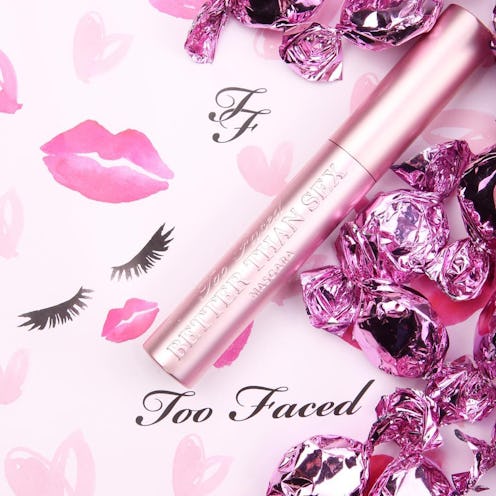
If you are a lover of mascara and dark, voluminous lashes, you've definitely heard about Too Faced's Better Than Sex mascara. Heck, you might even be a proud and loyal user of the cult-favorite beauty product. But Too Faced recently came under fire by the Better Business Bureau's National Advertising Division (aka NAD) for claims they made about the beloved mascara.
On the packaging for Too Faced's Better Than Sex Mascara, you'll find a claim that says it will give users "1,944 percent more volume" as well as before-and-after photographs as evidence. The NAD has taken issue with this and has recommended that the brand discontinue using this claim, both on packaging and in their videos online. The NAD noted that it was "troubled by the advertiser’s test methodology and concerned about the consumer relevance of the test methodology and results."
While Too Faced has agreed to permanently discontinue references to the increased volume claim being based on a “clinical study," they have also appealed the case, a Too Faced representative tells Bustle. They also shared the following statement with us:
Too Faced strongly stands behind its claims, and has appealed NAD’s decision in this case. The tests used to establish these claims were conducted using sound methodology at a highly-regarded independent laboratory, and the results support not only the 1,944% claim, but also the Before-and-After photographs at issue.
According to Too Faced, Better Than Sex is the best-selling mascara not just in the United States, but around the world. The reviews behind the sales also support the fact that it's a hit — it's received many mentions and accolades as being the best mascara on the market by beauty editors and publications alike.
Too Faced Better Than Sex Mascara, $23, sephora.com
But are customers of the mascara really buying it based off the advertising? That is the question, and the concern. The NAD is worried that customers could be swayed into buying the product because the brand claims it is "scientifically proven" to give their lashes an almost 2,000 percent boost. What's rather ironic, however, is that the NAD is not disputing the brand's claim that the mascara is, well, better than sex... because you can't really objectively prove that, can you? We'll give you a minute to lol.
This is not the first instance where the NAD has had a bone to pick with a beauty brand for its claims and advertisements with regard to mascara. In September, they also recommended Benefit Cosmetics to discontinue promoting its They're Real! mascara as "#1 best-selling." In 2013, they came after Maybelline for a print advertisement for its Volum' Express the Rocket mascara. The ad showed a model with full, thick lashes (likely false) and stated she was able to achieve them thanks to the product's ability to offer lashes that are "8x bigger," wrote The New York Times. In case you're wondering, the NAD isn't the only investigative unit of its kind. Across the pond, the Advertising Standards Authority in London asked Dior to pull print advertisements where Natalie Portman's eyelashes were digitally enhanced.
If history has taught beauty consumers anything, it's that this will not be the last battle between an advertising standard agency and a beauty brand, particularly one that sells mascara. In fact, it will likely become more common since there are even more ways than ever to advertise beauty products, not just in print, but online and through countless social platforms.
The only advice we can give you? Don't believe everything you read or see and use a discerning eye when looking at beauty advertisements. Another? Ask for samples so you can try a product before you purchase it. The most believable review is your very own.